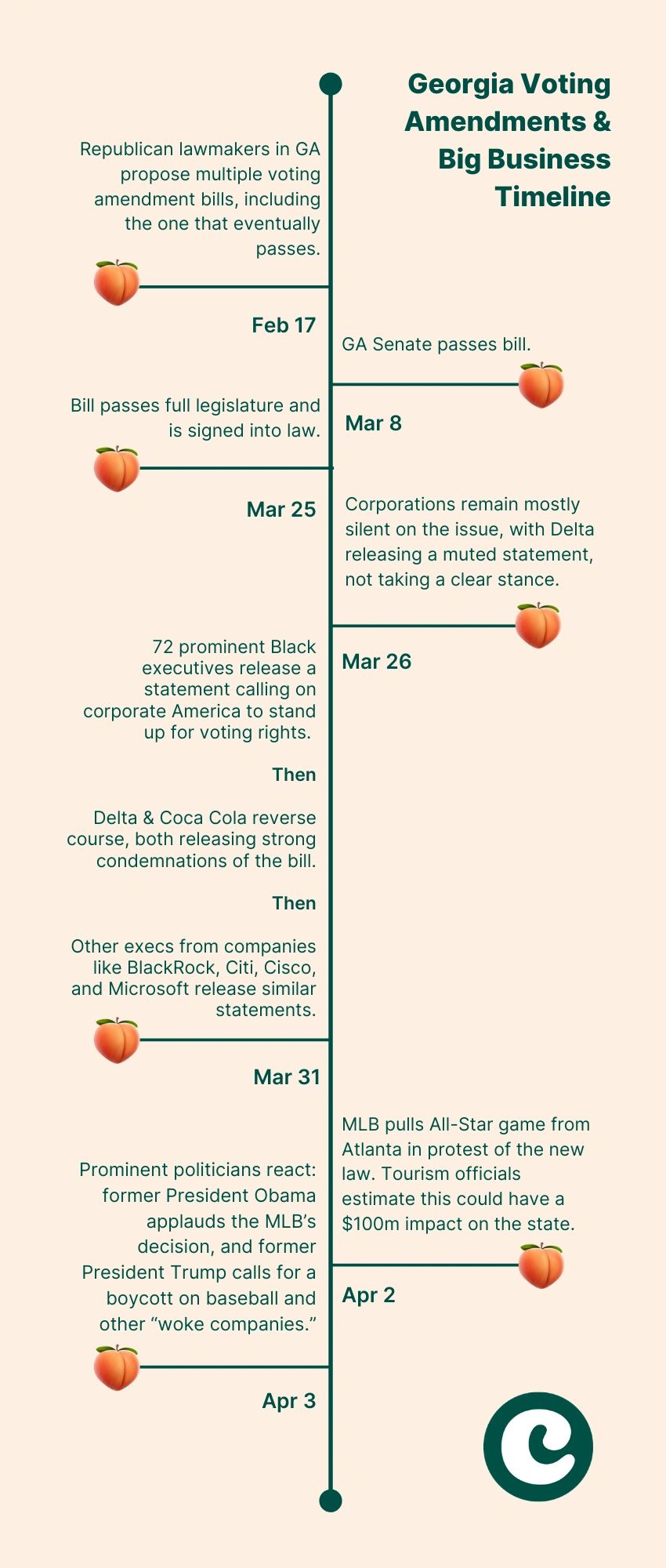By Maryclaire Manard
The Who, What, When & Why that You Need to Know
Georgia is on everyone’s mind.
Ever since the shake-up election results in Georgia from both the Presidential race in November and the Senate run-offs in January, there has been a lot of focus on Georgia and its elections.
The Republican-controlled Georgia legislature ultimately passed a 98-page piece of legislation in March, amending the voting laws in Georgia. Some of the key elements of the bill includes:
🍑New ID requirements for absentee voters
🍑Shortened absentee voting
🍑Guaranteeing but also limiting the number of drop boxes per county
🍑Making it a misdemeanor to hand out “any money or gifts,” including snacks and water for people waiting in voting lines.
The reaction to this newly passed law, among many others like it being proposed in state legislatures across the country is unanimously partisan. The Left is highly critical of any such voting amendments, saying it disproportionately restricts access for minority voters. The Right, on the other hand, supports these new measures believing it will re-instill confidence in our voting systems.
It’s important to note that in spite of heightened disinformation around voting irregularities in the 2020 elections, of the more than 161 million votes cast, there were no official findings of mass voter fraud, and only a handful (16) of individual cases of voter misconduct nationwide. And that’s according to findings from The Heritage Foundation, a Conservative think tank.
So what does this have to do with Corporate America?
In a recent blog post, we detailed how 2020 shaped brand activism, indicating that consumers and employees increasingly care about corporations acting in accordance with their values. Many companies have taken this as a cue to no longer stay silent on social and political issues. This was the case in Georgia.
Executives from Delta Airlines and Coca-Cola, two of the largest employers in the state of Georgia have released official statements condemning the passed bill, and the MLB recently announced moving their annual All-Star game out of the state entirely.
However, these weren’t the original stances of Delta and Coca-Cola. We break down the timeline here:
So what does this all mean?
Ultimately, it’s unclear if these corporate statements will have any effect on reversing a bill that has already been signed into law. But that’s not stopping folks from expressing their opinions.
Many on the Right are critical of these companies for speaking out (and especially for the MLB’s actions – noting that some other states have even more restrictive voting laws.) Many on the Left feel the statements from corporations like Coca-Cola and Delta are an attempt to try and have it both ways, too little too late, and potentially even trustwashing.
Trustwashing can be defined as a corporation acting in a performative way, such as with statements or marketing campaigns. While at the same time, not backing up these often embellished, values-based statements with proportional and consistent action.
One thing is for sure, public pressure can often play a major role in eliciting a response, regardless of the issue at hand.
While public statements may be new, corporate involvement in politics is not.
Many people may argue that corporations should “stay out of politics.” These people likely don’t realize that companies have been playing in politics for years. It just happens a bit more under-the-radar to the average person. (Pro-tip, download the Cluey Consumer app to see the political contributions of the brands you buy.)
Corporate PAC contributions have accounted for a massive chunk of political funding across federal, state, and local elections since the 1940s. The story with Coca-Cola and Delta in Georgia is no different.
We did some digging on Followthemoney.org, a nonpartisan group which tracks publicly available campaign finance data:
🍑In the last decade, both Coca-Cola and Delta combined donated to the political campaigns of 17 of the 23 Republican sponsors and Cosponsors of the bill.
🍑In addition, both corporations have donated to the campaign of Governor Brian Kemp, who signed the bill into law.
It’s only logical to conclude that intended or not, both of these corporations had a tangible impact of putting the people into power who made this bill in Georgia a law.
Which leads us to the bottom line:
While the efficacy of public statements may still be up for debate, corporations have been and will remain to be an influential part of our national conversation, whether we know it or not. For our readers whose views and values may vary, we’d recommend continuing to speak out, stay informed, and vote with your wallet whenever you get the chance.
Maryclaire is the CEO and Founder of Cluey Consumer. She started Cluey out of her personal frustration with the inconvenience and difficulty of aligning consumer behavior with personal political, social, and environmental values.

